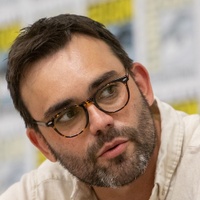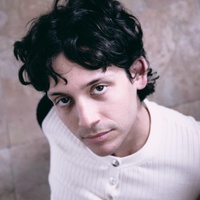On redefining perfection
Prelude
Jade Song is a writer and artist whose debut novel Chlorine was awarded the Alex Award and the Writer’s Center First Novel Prize, named a New York Times Editor’s Choice, and translated into multiple languages. The Black List selected her adapted screenplay of Chlorine for its annual Writers Lab. Their second novel, I Love You Don’t Die, is forthcoming March 2026. She is based in Brooklyn, where they pole dance and live with too many books.
Conversation
On redefining perfection
Writer and artist Jade Song discusses transitioning between mediums, making money from her art, and marveling at the gift of a residency.
As told to Ruth Minah Buchwald, 1795 words.
Tags: Art, Writing, Beginnings, Inspiration, Focus, Money, Day jobs.
You’re speaking to me from your first residency, at Vermont Studio Center. How has it been for you and your writing?
It’s been really nice. The first day I just sat in the chair in the studio and stared out the window because I couldn’t believe that this exists—that you are allowed to just come here for three weeks and have all your meals taken care of. All you have to do is sit here and do whatever you want. You honestly don’t even have to write. Of course you’re going to write or make art because that’s why you’re here, but there’s no expectation, really. And it’s all for free. I was like, “Why didn’t I apply to [residencies] earlier?” And then I was like, “Oh, right, because I was working.” You can’t take off three weeks of your life like that with a full-time job, usually. I’m trying to read a lot for sure, because when I was in New York recently, I didn’t have that much time to. I’ve also been trying to finish the first draft of my fourth book here.
How did you first identify as an artist and how has that identity evolved since then?
I was always making art, since I was young, but it was just my own paintings or these silly little art projects that my friends would support. I think in 2020, I was like, “It would be nice to try something new. I’ve always loved reading, so let me try writing.” I wrote my first short story and it got published, and it was a nice feeling to create this whole world through words. Then I just kept going.
Do you think about going back to painting?
I feel like my writing is interdisciplinary because I am inspired by different forms of art, from film to paintings. In an ideal world, in 10 or 20 years I can have my own studio in New York where I’m just painting and I don’t have to worry about money or anything like that. because it gives you plenty of time to experiment and try new things. But I’m not at that point yet, so we’ll see.
You were a very accomplished swimmer growing up, which has obviously influenced your writing. I imagine that you spend the same amount of time writing now as you did training as a teenager.
I think growing up being such a serious swimmer, and spending three to five hours a day in swim practice while being in school and just trying to be a teenager, really makes you better at organizing your time and structuring your life so that you can get everything done. I think that helped me a lot when I was working full time—knowing how to structure my day-to-day so I was able to get some writing in while not getting fired at my day job, and also having a life. Even though it would be really easy for me to just be super depressive and introverted, I’m like, “No, I have to go see my friends.” Friends are what keep you human.
You’re in a transitional phase right now, no longer working full-time in art direction. Are you planning to write full-time or are you open to other avenues?
I’d love to write full-time as long as it’s financially feasible. I have been freelancing for a friend who’s a creative director at a startup. Book advances and the random foreign sale have been keeping me afloat. I’ll do it for as long as it’s financially feasible. I can do this because I don’t have kids and my parents don’t need a caretaker yet. There’s a lot that contributes to me being able to do this that’s not just money-based.
You know how a lot of people say, “I’m nervous to make the art that I love my main source of income”? I think that when I was working full-time, I was like, “I don’t believe that. That sounds really nice because you don’t have to work full-time and you get to do what you love.” After I got laid off and writing became my main source of income, I was like, “Okay, I get what people mean now.” Before, I didn’t have to think about [if the project was] going to get sold or going to be read. I was purely writing for myself and my friends and because it was fun. Now I do [worry], “Okay, shit, do I want to work on this or do I want to work on this?” I want to work on both, but I’m going to choose the one that I think has the most viability of getting sold or earning me some form of income. I think part of me resents the fact that I do have to think about capital in this way. But I also think it’s irrational to pretend that I don’t have to think about things like this, especially because I don’t have family wealth or anything. I am a working artist. I think I struggle a lot with talking about capital and thinking about it, while also wanting to make art that’s not soiled by that thought. I still haven’t figured out the right balance or the way to do that yet. I don’t know if any working artist has, to be honest.
Do you know where a project is going to end up? Or do you allow yourself to follow an idea and trust that an ending will come?
It depends on the project. For my first two novels, I got these visions in my head and then was like, “Okay, how did they get there?” That’s what I’m writing to figure out. So I really don’t know what’s happening when I write the first draft. Then I started writing screenplays. Because they’re a lot more plot-based and there’s less interiority, I have to outline them out in a way that I don’t for my books.
The fourth book I’m working on now I’m calling “an involuntary memoir” after [Proust’s concept] of involuntary memory, but I think it’s definitely more autofiction… I wanted to try writing it because it’s based on my everyday, in a way. I don’t know what I’m going to do tomorrow. I don’t know what’s going to happen. But I’m going to write about it. It’s completely switching the way that I’ve been writing books, which is always knowing the ending and figuring out how we got there. I don’t know the ending of this book. I don’t know where it’s going, but that’s the whole point.
You’ve written a lot about being a voracious reader and writer, which I can attest to—you’re one of the most widely read people I know. How are you with revision? Are you gentle with yourself or hard on yourself, or both?
I’m not a perfectionist, which I think is how I’m able to write so much. I do kind of wish I was more of a perfectionist, but at the same time, I recognize that that’s impossible. Your writing is never going to be perfect, but the point is to get as close as you can. Perfect is subjective. Re-visualize. I recognize that that’s where the real writing is. That’s where the real story comes out. And I think revising is a pleasure because that’s when you realize, “Oh, this is what I’m trying to say. This is where the story is.” It’s just so much harder than vomiting out your first draft that I resent it, but I do know it’s probably the best part of writing.
You’ve talked about forming an artistic lineage for your first novel, Chlorine. You made an incredible Instagram for it, as well as for your upcoming books. Can you talk about your connection to writing and the internet? You were on Tumblr, right?
I never made that connection, but maybe it is true that the Instagrams I make for my books to hold all the inspirations [for them] really are based from that Tumblr era. I was on Tumblr, but I’m not anymore. It’s really joyful and fun to be able to scroll through and remember all the inspirations.
The internet was the first place where I met my writing friends, through online groups. At that time, I didn’t have community in the way that I do now, so I think it was really helpful and useful for meeting people. But I think that transitioning from online to offline is what really changed my life, so I guess that [the internet] was more like a tool for me to use to meet people. Real-life community has been offering me a lot of sustenance and joy. I am trying to not use social media as much… I think that there are pros and cons. Social media and the internet are really great for staying aware about the world and what’s going on and sharing how you feel. But I also think proximity to community is really important, and the best way to nourish that is to be there in person.
You recently adapted your novel into a screenplay that got you into the Black List Writers Lab last year. What was it like to adapt your own work into a new medium?
I actually think the screenplay for Chlorine is better than the novel because I was so inspired by the body horror movies of Julia Ducournau, David Cronenberg, and Ginger Snaps. Now I’ve written a few other feature-length screenplays and I’m able to recognize in my head what’s a better story for a novel and what’s a better story for a screenplay. After concentrating on one form for a really long time, I think that screenplays feel very mechanical. You have to follow a certain structure and you don’t put as much emotion into it. It’s a lot more concise than a novel, where you have a lot of room and freedom to play with structure, with language, with a character’s point of view. I think it’s just been fun to bounce back and forth.
Jade Song recommends:
Supporting and sharing your friends’ work:
The Way Spring Arrives and Other Stories, especially the story “New Year Painting, Ink and Color on Rice Paper, Zhaoqiao Village” by Chen Qian, translated by Emily Xueni Jin
The poem “Good Grief” by Laetitia Keok
The short story “Adrift in the South” by Xiao Hai, translated by Tony Hao
新新人类 Pixel Perfect, a Chinese-language podcast about living with technology
The comics of Christina Chung
- Name
- Jade Song
- Vocation
- writer, artist
Some Things
Pagination



